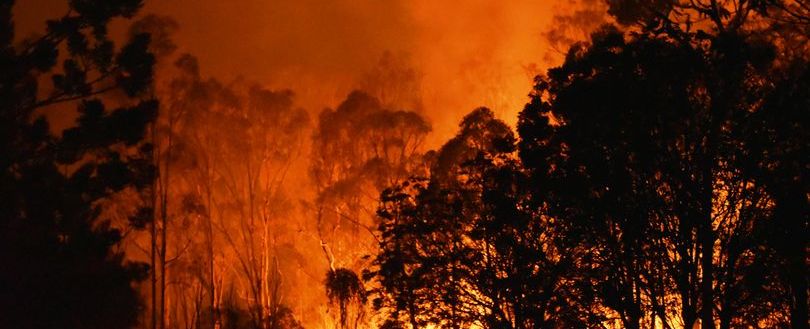
Cannich wildfire could be largest recorded in UK
Like it? Share it!
01 June 2023
The Scottish Fire and Rescue Service (SFRS) said flames had burned through a 30 sq mile (80 sq km) area of scrub and woodland near Cannich in the Highlands.
Crews have been at the scene since Sunday, but the area has been affected by four separate fires since last week.
A 12-mile (20km) plume of smoke from the latest incident was detected from space by Nasa satellites.
Further analysis, including of satellite data, will confirm the eventual scale of the wildfire.
The incident has been hugely challenging for dozens of firefighters due to the terrain, and warm, dry and windy weather.
Two firefighters were hurt at the scene of the blaze after their all-terrain vehicle overturned.
They have been released from hospital following treatment and an investigation has begun into the cause of the accident.
Firefighters from across the Highlands, along with deer stalkers and waterbombing by helicopters, have been tackling the flames.
SFRS group commander Jamie Thrower said the fire had affected an area about five miles (8km) long and six miles (10km) wide.
He said: "We have got control of the fire and have the fire surrounded. Helicopters have been a useful tool for that and we have stopped the fire from spreading, but the weather is still causing a challenge."
Dr Thomas Smith, an associate professor in environmental geography at the London School of Economics, said satellite data going back about 20 years would help to confirm the scale of the wildfire, and if it is the largest recorded.
He said he was awaiting the latest satellite information for calculations to be made.
Before the incident at Cannich, the UK's biggest wildfire affected 20 sq miles (53 sq km) of peatland in Sutherland's Flow Country in May 2019, and the second largest occurred this April at Glenuig in Lochaber and involved about 13 sq miles (35 sq km).
Forestry and Land Scotland (FLS) said it was believed the wildfire was associated with wild camping, and SFRS has urged people to be careful around campfires and disposing of cigarettes.
Energy company SSEN Transmission said it was monitoring the fire because of a number of electricity towers in the area.
It said there was no damage or threat to disruption of the electricity supply.
A spokeswoman said: "Our engineers have been on site and inspected the overhead powerline where it crosses through the affected area to safely assess for any impact as a result of the wildfire.
"We'll continue to monitor the area to ensure the line remains in safe operation, and liaise with fire and rescue services as required."
RSPB Scotland said the fire had spread on to its Corrimony Nature Reserve and had damaged birch woodland and heather moorland.
The reserve's Simon McLaughlin said the activities of ground-nesting birds had been badly affected and some species, including frogs, had died in the fire.
Trees planted, some by local schoolchildren, in an effort to regenerate native woodland have also been destroyed.
Mr McLaughlin said: "I got a wee card last night from the Cannich School kids saying sorry for the damage caused and they are here to help."
The majority of incidents are caused by accident, according to Forestry and Land Scotland.
The Scottish government agency said people did not realise how quickly an ember from a campfire or a dropped cigarette could develop into a wildfire in an area of dry vegetation or woodland.
Wildfires can result in the release of carbon.
May 2019's wildfire in the Flow Country in Sutherland released an estimated 700,000 tonnes of greenhouse gases into the atmosphere during the incident, according to a WWF Scotland study.
Other parts of Scotland have also seen major incidents.
In April 2019, a major wildfire near Paul's Hill wind farm at Knockando, south west of Elgin, destroyed more than 20 square miles (72 sq km) of grassland.
The Scottish Greens said the Highland region alone had seen about 360 recorded wildfires between 2017 and 2022.
Greens MSP Ariane Burgess said: "My thoughts are first of all with the two fire-fighters who have been injured."
She added: "The Highlands are on the front line of the climate crisis, make no mistake.
"Our habitats and our land use, our size and geography, and our place as the jewel in Scotland's natural crown means what we do here is of vital importance."
To finish reading the full article and watch the video, visit the SOURCE here.
Our eNews provides regular insight into industry trends, news headlines, and product and service information. For news articles parallel to those mentioned above, sign up for our eNews. Click here to sign up: Subscribe to our enews (fia.uk.com)
Related training
Related news
-
Fire Enforcement Notices Served on Hinkley Point C Contractors
25 February 2026
-
BS 9990 Draft for Public Comment Now Open
06 February 2026
-
UK Government Updates its PFAS Plan
05 February 2026
Related resources
-
Fire Risk Assessors Standard Scope of Services
07 August 2025
-
Guidance Document Attestation of Fixed Firefighting Systems
18 October 2024
